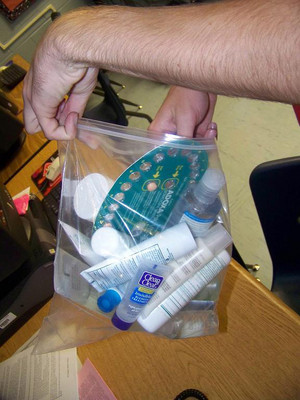Only Skin Deep
Teens are not normally afraid of dots.
Dots cover their clothes, are part of their Web site addresses and end every sentence of their term papers.
It's the ones that make homes on their faces that cause them to fret, the ones that come in all shapes and sizes, colors and locations: acne.
When puberty hits, teenagers undergo all sorts of changes to their bodies, from the pitch of their voice to their height and sometimes weight. For some teenagers, these changes also involve the appearance of acne vulgaris, blemishes such as pimples and plugged pores (blackheads and whiteheads) that can scar and disfigure the skin.
While many teens have mild to benign cases that hardly affect them, others must deal with the effects of acne every day.
Matt Cowles, a senior at Liberty High School, has suffered from acne for six years and has been pursuing a treatment for four years.
"At first (dermatologists) told me that it was just normal stuff, like 'Blah, blah, blah, you're going through puberty. It's just there, you'll grow out of it,' " Cowles said.
While acne normally stops affecting people by the age of 25, dermatologist Dr. Curt Samlaska said 12 percent of women and 3 percent of men will be affected until the age of 44.
After getting two more opinions, Cowles realized that he might fall in the 3 percent. He went through four dermatologists and tried everything from over-the-counter products to home remedies, such as using lemon juice, saltwater, ice or calamine lotion to clear his skin.
Samlaska said he never has heard of such remedies and that these folklores might be the result of a desperate patient.
"I have had some patients that have told me that they believe that going to the ocean (for) saltwater exposure is good for their acne," Samlaska said. "In actuality, it is the sun exposure that is more important, and used to be an old form of treatment for acne many years ago."
Cowles said he found his treatment methods on the Internet, citing not desperation, but interest.
Having tried the popular product Proactiv, which did him no good, he simply wanted other options.
So when a dermatologist prescribed Accutane to Cowles, he saw it as a saving grace. But he said it began to affect his emotions.
After bursting into tears for no reason while sitting in the stands at a football game, he turned again to something new.
Samlaska calls Cowles' case "like most side effects, very individual" and said that he's normally concerned with the opposite effect of Accutane on teens, such as kids becoming overly social and outgoing.
"Accutane is an amazing drug and is the only medication that can permanently affect acne," Samlaska said. "In over 20 years of prescribing Accutane, the number of patients that I have had to discontinue the medication for reasons of mood swings or depression I can count on one hand."
The greater concern over Accutane, which is available only by prescription, is a link to birth defects.
The manufacturer of the drug, Roche Laboratories, warns that the drug "must not be used by female patients who are or may become pregnant" because of "extremely high risk that severe birth defects will result."
Because there aren't many medications that are fail-proof, many teens are just as lost as Cowles.
According to Samlaska, unless teenagers are using Accutane, they should wait between four to six weeks to see if a treatment is working.
Samlaska said that products such as Neutrogena and Clearasil work for those with mild cases of acne, but prescribed treatment is more reliable and effective.
He warned that these over-the-counter treatments might also have much more than or much less than the 2.5 percent to 10 percent of benzoyl peroxide that is required.
Though many people like to attribute the acceleration of acne to foods such as chocolate, french fries and pizza, there are no clinical studies that prove this theory.
The only food known to cause acne is seaweed, because of its high dose of iodides which promote acne, but it would have to be consumed in large amounts.
According to Samlaska, genetics is normally one of the biggest reasons for bad acne, as well as medications such as systemic steroids, which are given orally or injected into the vein or muscle and are sometimes used to treat nasal or sinus inflammation. Other medicinal sources could be anti-epileptic medications, testosterone and cyclosporine, which is used to suppress the immune system in cases of diseases such as psoriasis.
Acne also can be promoted through exposure to industrial chemicals such as lubricated oils, asbestos and the herbicide Agent Orange, which can cause a severe acne called chloracne.
While many teens struggle to find medications that work, acne can affect their self-esteem.
"We have a lot of people who are self-conscious," Liberty counselor Susan Sawyer said. "We look in the mirror 20 times a day. (Acne) affects how we feel about ourselves."
Erica Harrell, who graduated from Liberty last year, blames the media for this self-consciousness.
"The media portray people to be perfect and that acne is imperfect," Harrell said. "People don't want to accept imperfections."
Cowles has moved on from the situation, no longer affected or hindered by his acne.
"I've had trouble with acne for so long that I don't remember what I looked like without it," he said. "It's just a part of me; it's who I am right now."
R-Jeneration


















